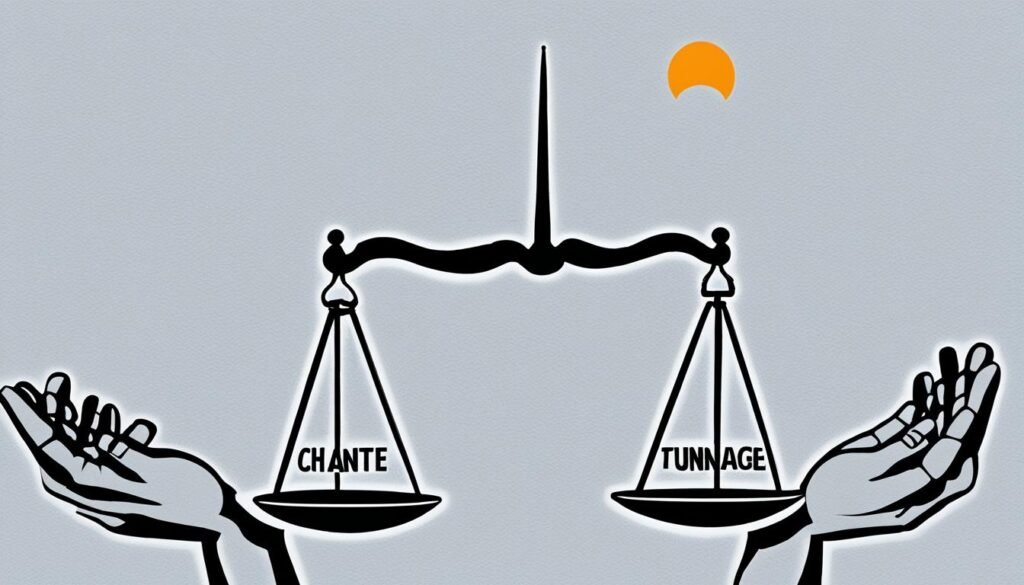The competence of Tunisian higher education systems in equipping students for today’s competitive market remains questionable. Highlighted by escalating unemployment rates among graduates, a disparity evidently exists. A meticulous examination of the challenges, complemented by the introduction of avant-garde strategies, is imperative for bridging this chasm. This discourse embarks on a comprehensive exploration of Tunisia’s evolving socio-economic and educational terrains. We aim to dissect the prevalent maladies within the existing framework and furnish profound insights into viable rectifications.
Key Takeaways:
- Tunisia faces a pressing question regarding the alignment of its education system with the demands of the economy.
- Unemployment rates among graduates highlight the need to study the gaps and challenges faced by higher education in Tunisia.
- Exploring strategies for affordability, skill-building, job opportunities, technology integration, quality assurance, language proficiency, research and innovation, student support services, internationalization, and effective policy and governance can pave the way for higher education success in Tunisia.
- By implementing these strategies, Tunisia can unlock its potential, enhance students’ personal and professional development, and position itself as a leader in the global knowledge economy.
The Impact of the Gap Between Education and Economy in Tunisia
The divergence between education and the economic framework significantly influences societal evolution and development. In Tunisia, escalating unemployment rates among graduates underscore the imperative to reconcile educational programs with economic demands. This predicament necessitates an in-depth analysis of the interconnections among societal transformation, economic shifts, educational innovations, and the theory of matching. Regrettably, the extant reforms within Tunisia’s higher education sector fall short of fulfilling the exigencies of society and the economic landscape.
Graduate unemployment in Tunisia casts doubt on the education system’s efficacy in equipping students for the workforce. A pronounced misalignment exists between the competencies imparted by universities and those requisite in the labor market. This dichotomy necessitates urgent rectification; absent this alignment, graduates grapple with joblessness, thereby stymieing economic advancement.
The exploration of social transformation dynamics in Tunisia yields insights into the populace’s evolving aspirations and necessities. As society progresses, it is incumbent upon the education system to evolve correspondingly, ensuring alignment with emergent demands. Concurrently, economic flux engenders novel challenges and prospects, necessitating adaptive educational strategies.
For the mitigation of the education-economy divide, educational innovation emerges as paramount. Promoting skill enhancement, entrepreneurship, and the incorporation of practical experiences within curricula, higher education institutions can substantially prepare students for labor market exigencies. Moreover, the matching theory accentuates the necessity of tailoring educational programs to forecasted economic needs.
Yet, Tunisia’s higher education reforms have inadequately bridged this education-economy gap, thereby impeding progress. An urgent exploration into the factors perpetuating this chasm, coupled with the formulation of effective strategies, remains warranted.
To comprehend the ramifications of this divide on societal and economic development, Tunisia must champion comprehensive educational reforms. This discourse will segue into a detailed examination of the obstacles confronting higher education reforms in Tunisia and propose actionable solutions to these quandaries.
Challenges Faced by Higher Education Reforms in Tunisia
The higher education reforms in Tunisia are confronted with a range of challenges that need to be addressed in order to align with the social and economic changes taking place. These challenges include a gap between theory and practice, limited creativity and predictive abilities, problems in specialty creation, and a disconnect between past, present, and future.
The gap between theory and practice poses a significant challenge for higher education reforms in Tunisia. While theoretical knowledge is essential, it is equally important for students to acquire practical skills and apply their knowledge in real-world situations. This gap prevents graduates from fully meeting the demands of the job market, resulting in unemployment and underemployment.
Moreover, limited creativity and predictive abilities hinder the effectiveness of higher education reforms. The rapid pace of societal and economic changes requires educational institutions to be adaptable and forward-thinking. However, the current system often fails to cultivate creativity and innovation among students, stifling their ability to anticipate and meet future challenges.
Addressing these challenges is crucial to ensure that higher education reforms in Tunisia support the needs of society and the economy. By bridging the gap between theory and practice, fostering creativity and predictive abilities, and promoting specialty creation, Tunisia can enhance the relevance and effectiveness of its educational system.
Additionally, problems in specialty creation pose a challenge to higher education reforms. The existing system often lacks the flexibility to anticipate emerging fields and adapt curricula accordingly. As a result, graduates may find themselves ill-equipped to address new and evolving demands in the job market.
Furthermore, there is a disconnect between past, present, and future in the higher education system. Traditional teaching methods and outdated curricula may not adequately prepare students for the current and future needs of society and the economy. Reforms should address this issue by integrating contemporary knowledge, skills, and technologies into the educational framework.
Overcoming these challenges requires a comprehensive approach that involves collaboration between educational institutions, policymakers, employers, and other stakeholders. By addressing the gap between theory and practice, promoting creativity and predictive abilities, ensuring the relevance of specialty creation, and bridging the disconnect between past, present, and future, Tunisia can foster a higher education system that effectively prepares students for the dynamic demands of the modern world.

Recommendations for Educational Reforms in Tunisia
To ensure educational reforms in Tunisia align with evolving social and economic landscapes, an array of recommendations has been proposed. These aim to address the prevailing challenges within the current framework, pushing for a comprehensive reform strategy tailored to Tunisia’s unique context.
Foremost, bridging the theoretical and practical divide in higher education emerges as a critical priority. Establishing robust connections between academic curricula and their practical application in the real world is essential. This could be facilitated through integrated internships, fieldwork, and collaboration with industry, thereby arming students with requisite skills for the labor market.
Furthermore, it is imperative that reforms are sensitive to the distinctive social, economic, and cultural backdrop of Tunisia. A deep understanding of the specific hurdles faced by the nation’s students and institutions allows for the crafting of pertinent and impactful solutions.
“Education is not the filling of a pail, but the lighting of a fire.” – William Butler Yeats
Nurturing creativity within the reform agenda is another vital recommendation. By prioritizing critical thinking, problem-solving, and innovative capacities within the curriculum, students become equipped to navigate the complexities of a dynamic global landscape. The promotion of interdisciplinary learning and the encouragement of collective projects can significantly bolster students’ innovative capabilities.
Moreover, the accumulation of empirical data through quantitative research on reform efficacy is a recommendation of notable importance. Analyzing reform outcomes, such as graduation and employment rates alongside student satisfaction, can illuminate the effectiveness of initiatives, guiding future improvements.
It must be noted that these recommendations are not comprehensive but offer a flexible framework for enhancing Tunisia’s higher education sector. Implementing these reforms will not only prepare students more effectively for future challenges but also close the chasm between academia and the employment arena, fostering national development.
Achieving Higher Education Affordability in Tunisia
Higher Education Affordability, Tunisia
The quest for higher education affordability in Tunisia stands as a pivotal cornerstone for academic success. It is imperative to ensure educational opportunities are within reach for every student, thereby enhancing the overall efficacy of the educational framework. Through the adoption of multifaceted strategies, Tunisia is poised to advance towards greater affordability in higher education for its students.
Financial Aid and Scholarships
To ameliorate higher education affordability in Tunisia, the implementation of financial aid and scholarship programs is essential. Offering monetary support based on students’ financial needs lays the foundation for inclusivity in higher education. Additionally, scholarships serve to acknowledge academic achievements, motivating students to fulfill their educational pursuits.
Public-Private Partnerships
Furthering higher education affordability necessitates the formation of public-private partnerships. Such collaborative endeavors with the private sector can unlock external funding, thereby alleviating the financial constraints faced by students. These partnerships foster the creation of educational endowments and sponsorship schemes, significantly mitigating the expenses tied to higher education.
Cost-Saving Measures
Integral to the pursuit of higher education affordability in Tunisia is the implementation of cost-reducing strategies. Rationalizing the allocation of resources, optimizing administrative procedures, and integrating technology are paramount. These efficiencies enable educational institutions to extend financial reliefs such as lower tuition fees to their students, thereby enhancing affordability.
“Higher education affordability transcends mere cost reduction; it embodies the creation of a landscape where every student can chase their educational dreams devoid of financial hindrances.”
The endeavor to render higher education more accessible and economical is a collective undertaking, necessitating the cooperation of governmental bodies, academic institutions, the private sector, and other stakeholders. By concerted efforts in facilitating financial aid, fostering public-private partnerships, and executing cost-saving initiatives, Tunisia is on course to realize a significant stride towards the affordability of higher education. This ensures the empowerment of each student to pursue their academic ambitions unimpededly.
Skill-Building Opportunities in Higher Education
Higher education transcends mere academic pursuit; it is a portal to invaluable skill-building ventures. Tunisian universities and colleges commit to endowing their students with practical experiences. These include internships and workshops, pivotal for navigating the job market successfully.
Such initiatives span entrepreneurship, innovation, and critical analysis. Engagement in these programs equips students with enhanced employability, fortifying their standing in competitive sectors.
Key in these institutions’ approach is the integration of experiential learning. Collaborative industry projects offer students a platform to apply theoretical knowledge pragmatically. They tackle intricate problems, gaining insights relevant to their fields.
Internships form a crucial pillar of these skill development opportunities. They facilitate industry-specific learning, networking, and comprehension of occupational landscapes. Through these, students refine practical skills and comprehend professional intricacies.
Moreover, workshops and seminars aim to strengthen critical and innovative thinking. These forums encourage the application of problem-solving techniques. Participation therein cultivates competencies coveted by employers.
A workshop on entrepreneurship, for instance, might offer insights into crafting business strategies, market analysis, and the acumen necessary for entrepreneurial success. These programs propel students towards harnessing their potential. They prepare them to excel in the job market, contributing significantly to Tunisia’s economic advancement.
Providing Essential Skills for the Future
The transition to a knowledge-based economy underscores the need for Tunisia’s higher education to forestall future job market challenges. Skill-building embedded within academic curriculums primes students for adaptability. It fosters a culture of perpetual growth, equipping them with instruments for navigating industry evolutions.
“Skill-building opportunities in higher education are vital for student success. By fostering a practical-oriented approach, internships, and workshops, Tunisian institutions can empower students and equip them with the skills needed to excel in their careers.” – Tunisian Association of University Presidents
Incorporating practical experiences and workshops into the educational fabric, Tunisia’s academic institutions create a comprehensive learning ambiance. This preparation differentiates students in the employment arena, priming them for professional triumph.
Job Opportunities for Tunisian Graduates
The success of higher education in Tunisia hinges significantly on job opportunities for graduates. As someone who has dedicated years to academic and skill development, the post-graduation phase marks the beginning of an impactful career journey. This transition from academia to the professional world deserves a robust support structure.
Tunisia is enhancing graduate employability through strategic partnerships with diverse industry sectors. This initiative aims to ensure the acquired academic knowledge and expertise align closely with current market demands. It embodies an effort to mitigate the gap between the educational and professional realms, enhancing the relevance of your qualifications in the evolving job market.

Furthermore, Tunisia is launching comprehensive career development programs. These are designed to arm graduates with critical job-seeking skills, including but not limited to crafting an impactful resume, mastering interview techniques, and effective networking. Engaging in these programs promises to sharpen your competitive edge, bolstering your employment prospects.
The nation is also committed to fostering entrepreneurship as a viable avenue for job creation. To this end, it supports emerging entrepreneurs with mentoring, financial aid, and incentives. These efforts are directed at nurturing an innovative and dynamic entrepreneurial ecosystem. This environment is intended to facilitate innovation, thereby generating new employment opportunities.
To augment employment prospects, Tunisia is facilitating direct interactions between graduates and potential employers. Methods include internships, job fairs, and leveraging alumni networks. Such platforms serve as critical channels for showcasing your talents and competencies to a broad audience of potential employers. This approach is designed to enhance your job market visibility.
The transition from academia to a fulfilling career encompasses numerous challenges. Nevertheless, Tunisia’s unwavering support for its graduates plays a crucial role in navigating this journey successfully. The education you have received has meticulously prepared you to excel in your chosen field. With the provision of suitable opportunities, you are well-positioned to transform your aspirations into tangible achievements.
It is imperative to pursue a proactive stance in career development, continuously honing your skills and exploiting available job opportunities. Through unwavering determination and persistence, you are capable of launching a rewarding career that not only complements your academic background but also fulfills your personal ambitions.
The Role of Technology in Higher Education Success
Embracing technology within higher education realms fosters significant advancements in pedagogical successes. The contemporary digital era necessitates the assimilation of technological tools into educational paradigms. Such integration arms students with requisite proficiencies to navigate modern world challenges adeptly.
The adoption of online learning platforms epitomizes one modality through which technology bolsters higher education. These platforms afford students flexibility and accessibility in engaging with coursework, peer collaboration, and instructor communication. Tunisia’s leverage of such platforms can democratize educational access, surmounting traditional barriers linked to geographical and temporal constraints.
Virtual classrooms, by their design, transform conventional educational settings. Embedding real-time discussions, interactive exercises, and instant feedback mechanisms within these virtual spaces cultivates a dynamic learning environment. It fosters collaboration and critical thought, pivotal for grooming students for success in technology-centric vocations.
The concept of distance education further delineates technology’s pivotal role in educational excellence. Tunisian academic entities, through online programs and coursework, can extend their reach to include professionals and geographically hindered individuals. This mode of education champions lifelong learning and skill enhancement, vital for maintaining relevancy and competitiveness within professional arenas.
Moreover, technology’s capacity to underpin personalized learning trajectories is noteworthy. Through adaptive learning systems, educational content is tailored based on the analysis of individual student data. Such systems offer personalized recommendations, optimizing educational outcomes and providing essential support tailored to student needs.
Benefits of Technology Integration in Higher Education
Technology enriches the educational experience by providing interactive and engaging modalities that captivate and stimulate student curiosity.
Virtual classrooms and online forums promote a culture of collaboration among students, essential for honing teamwork and communication skills.
Online learning resources and distance education programs afford continual educational and professional upskilling opportunities across one’s career lifespan.
Technological advancements serve to democratize education, ensuring it is accessible to those hindered by geographical, financial, or other barriers.
Personalized learning made possible through technology addresses unique student learning preferences and needs, fostering a tailored educational support framework.
The strategic incorporation of technological innovations into higher education propels Tunisia towards elevating its educational framework, equipping students with future-ready skills, and augmenting the efficacy of higher education nationwide.
The Importance of Quality Assurance in Higher Education
Quality Assurance is vital in higher education’s perpetuity and triumph. Institutions in Tunisia elevate the caliber of their academic offerings by embracing accreditation protocols, scrutinizing educational programs, and championing perpetual enhancement. Such endeavors foster an enriched academic milieu, conducive to profound learning and intellectual growth.
Accreditation protocols are pivotal as a yardstick for ascertaining educational quality. These frameworks, established by recognized entities, mandate that educational institutions adhere to prescribed standards. This adherence ensures the provision of a superior educational voyage for students, marked by consistency and excellence.
The scrutiny of academic programs encompasses a thorough evaluation of curricula, pedagogical approaches, and outcome achievements. It unveils areas necessitating refinement, guaranteeing the timeliness and relevance of academic offerings. Furthermore, it enables institutions to tailor their programs, aligning them with the dynamic exigencies of the employment market and the academic aspirations of students.
“Continuous Improvement is essential in higher education. It is an ongoing process of evaluating and enhancing various aspects of education, including teaching methods, assessment practices, and student support services. By continuously striving to improve, institutions can provide a better learning environment for students and ensure their success in the competitive world.”
Engagement with global quality assurance bodies significantly propels the quality of higher education. Such collaborations facilitate the assimilation of international best practices into local contexts. Benchmarking against global standards elevates Tunisian institutions’ stature, augmenting their allure to both domestic and international scholars and employers.
The Role of Quality Assurance in Student Success
- Ensuring a Relevant and Updated Curriculum: Quality assurance processes ensure that the curriculum offered by higher education institutions is aligned with the needs of the industry and society. This ensures that students are equipped with the necessary knowledge and skills required for their chosen careers.
- Promoting Effective Teaching and Learning: Quality assurance helps evaluate and improve teaching methods, ensuring that students receive high-quality instruction. This promotes effective learning and enhances student engagement and satisfaction.
- Providing Supportive Student Services: Quality assurance ensures that adequate student support services, such as academic advising, counseling, and career services, are available. These services play a crucial role in helping students succeed academically and transition into their careers.
Quality assurance is the backbone of superior learning environments that underpin student achievement and readiness for upcoming challenges. By allocating resources to quality assurance, Tunisia amplifies its educational system’s prestige. Consequently, it attracts scholars, academics, and investment on a global scale.

The Role of Vocational Education in Higher Education Success
The integration of vocational education into higher education frameworks markedly enhances their efficacy. Offering practical, career-focused programs enables Tunisia to diminish the disconnect between educational outcomes and labor market requisites. By imparting skills and knowledge pertinent to specific careers, vocational education escalates employability and contributes to economic expansion.
Vocational programs are engineered to provide hands-on experience and extensive expertise in sectors like healthcare, technology, and engineering. They meld theoretical learning with practical application, thus equipping graduates with competencies sought by employers. Incorporating such programs within higher education institutes allows Tunisia to cultivate a labor force adept at navigating the complexities of the contemporary job market.
Moreover, vocational education serves as a catalyst for entrepreneurship and innovation. It equips students with essential resources and fosters abilities in creativity, problem-solving, and critical analysis, thereby enabling students to initiate businesses independently. These programs underpin students’ transition into economically proactive and autonomous entities.
Vocational education plays a crucial role in bridging the skills gap present between academia and the employment sphere. It aligns its curriculum with industry demands and collaborates with local enterprises, ensuring the transfer of pertinent skills and knowledge. This alignment not only augments employment prospects but also enriches Tunisia’s economic fabric.
Furthermore, vocational education enhances social mobility by crafting career avenues for individuals previously excluded from traditional academic pathways. Acknowledging the value of vocational aptitudes ensures equitable educational opportunities, fostering success across varied demographics.
The significance of vocational education in bolstering higher education’s impact is profound. Tunisia stands on the cusp of revolutionizing its educational landscape through vocational programs. This approach will yield a workforce of exceptional skill, spur innovation, narrow the skills gap, and elevate social mobility. By integrating vocational learning into its educational corpus, Tunisia envisages a future where its graduates are primed for success in the global economy.
The Importance of Language Proficiency in Higher Education
Within the context of Tunisia’s higher educational framework, the mastery of English and French emerges as critical. This proficiency enables students to effectively articulate thoughts and maneuver through the complexities of the global employment landscape. Institutions of higher learning bear the responsibility of amplifying language instruction, fostering environments conducive to language immersion. Such initiatives prepare students to excel both academically and professionally by arming them with essential communicative competencies.
The command over English and French grants access to a plethora of opportunities. Mastery in these languages not only catalyzes academic achievement; it also facilitates participation in international collaborations and exchange programs. For Tunisian students, fluency in English—the de facto language of global academia and business—offers unfettered access to an expansive array of academic materials, scholarly articles, and symposiums. Concurrently, French proficiency opens gateways to Francophone educational and research entities, broadening academic vistas.
The path to linguistic adeptness transcends conventional classroom pedagogy. Programs emphasizing language immersion emerge as profoundly impactful, plunging students into environments where English or French prevails. These experiences markedly enhance language competence through direct engagement in real-world contexts. Complementary to immersive experiences, digital platforms and online resources present flexible, customized avenues for language refinement, enriching traditional educational methodologies.

“Language proficiency is a gateway to personal and professional growth. It empowers students to confidently communicate, collaborate, and compete in the global market.” – Dr. Samira Ahmed, Linguistics Professor at the University of Tunis
Moreover, linguistic mastery significantly contributes to the cultivation of critical thinking and cross-cultural insight. It opens channels for students to assimilate diverse viewpoints, enriching their intellectual landscapes and engendering a cosmopolitan outlook. As Tunisia escalates its transition towards a knowledge-centric economy, the valence of language proficiency amplifies, serving as a cornerstone for innovation and creative endeavor.
In summation, the intricacies of language proficiency are indispensable to securing academic and subsequent vocational triumphs in Tunisia. By elevating language education, endorsing immersive learning environments, and harnessing digital advancements, tertiary institutions equip students with vital communicative tools. Such competencies not merely elevate job marketability but also spur international engagements and exchanges, catapulting Tunisia to the forefront of the global knowledge echelon.
Enhancing Research and Innovation in Higher Education
Emphasizing research and innovation within higher education realms is vital for nurturing a dynamic academic landscape while catalyzing economic propulsion. By amplifying research fund allocation, creating specialized research hubs, and cultivating an innovative ethos, Tunisia aims to ascend as a pivotal knowledge-driven economy, leading in global innovations.
The active involvement of both academia and scholars in research ventures forms the bedrock for revolutionary findings, significantly contributing to societal advancement. Research avenues foster the exploration of novel concepts, confrontation of prevailing theories, and broadening of scholarly horizons across diverse fields.
“Research is the key to unlocking the door of innovation. It allows us to push the boundaries of what is known and create new solutions to complex problems.” – Dr. Samir Abidi, Professor of Science and Technology.
Allocating substantial investment towards research infrastructure and resources is crucial for backing avant-garde initiatives and magnetizing elite intellects. By providing researchers with cutting-edge facilities, progressive technologies, and scholarly access, Tunisia can nurture a ground conducive to significant research impacts.
Interweaving research and innovation into the educational syllabi enables students to cultivate analytical reasoning, adept solving of intricate issues, and an enduring zeal for knowledge acquisition. Opportunities in research offered to students, such as undergraduate research engagement and internships, are pivotal in igniting intellectual curiosity and ensuring professional preparedness.
The Benefits of Research and Innovation in Higher Education:
- Generates new knowledge and contributes to the global academic community.
- Drives technological advancements and innovation.
- Attracts research collaborations and partnerships with industry.
- Enhances the reputation and ranking of higher education institutions.
- Creates opportunities for commercialization and economic growth.
- Addresses societal challenges and improves quality of life.
Adopting a research-centered strategy positions Tunisia to equip ensuing generations with indispensable competences for thriving in an incessantly shifting global milieu. The collaborative interplay among academic sectors, industrial realms, and governmental frameworks is instrumental in fostering an ecosystem that promotes research and innovation, thereby achieving sustained advancement and attaining national goals.
Promoting Student Support Services in Higher Education
In the realm of higher education, the provision of student support services is critically important. These services, as recognized by Tunisian higher education institutions, are fundamental in ensuring a successful academic journey for students. They encompass a comprehensive suite of offerings, including academic advising, counseling, career services, and mentorship programs. The aim is to promote student success and overall well-being.
Academic advising is pivotal, providing guidance through course selection and ensuring adherence to academic goals. It involves trained advisors who deliver personalized assistance. This support helps students to effectively navigate the complexities of higher education.
Counseling services are dedicated to fostering mental and emotional health. Professionals in this field create a confidential environment for students to explore personal challenges. They offer tools for managing stress, anxiety, and other mental health issues.
Career services focus on preparing students for post-graduation employment. They offer resources for job searching, assistance with resumes and interviews, and networking opportunities. Such services are geared towards enhancing student employability.
Mentorship programs offer connections to professionals and alumni who provide valuable guidance. These programs are designed to develop essential skills, expand networks, and offer career insights. They play a crucial role in professional and personal development of students.
Student support services are essential for enhancing student retention and achieving success in higher education. Tunisian institutions show a profound commitment to holistic student support, fostering both academic and personal growth.

The ultimate goal of student support services is to empower students, equipping them with resources to excel academically and personally. Through fostering well-being, satisfaction, and success, Tunisian higher education institutions contribute to an enriched educational experience.
Internationalization of Higher Education in Tunisia
The internationalization of higher education stands as a pivotal element in Tunisia’s endeavor towards global prominence. By integrating international strategies, Tunisian universities can elevate their prestige worldwide. Such efforts promote cultural diversity and exchange on campuses.
Attracting foreign learners remains central to this mission. Welcoming students globally transforms Tunisian campuses into dynamic, multicultural hubs. This fosters an exchange of diverse ideas, perspectives, and life experiences, greatly enriching the educational journey for everyone involved.
Evolving through solid international alliances marks another avenue for expansion. Partnerships with various global institutions lead to joint research endeavours, faculty exchanges, and pathways for student mobility. These alliances are critical for the dissemination of knowledge, propelling innovation, and widening academic circles.
Offering experiences abroad represents a vital facet of internationalization. Such programs empower Tunisian students with global insights, cross-cultural competencies, and understanding of varied academic realms. The benefits of studying abroad are manifold, enhancing adaptability and amplifying career prospects globally.
Internationalization doesn’t just uplift students; it propels the entire educational fabric of Tunisia forwards. It equips graduates for the global workforce, fosters cross-cultural comprehension, and elevates academic offerings in relevance and quality.
The drive towards internationalizing higher education in Tunisia is a deliberate stride towards crafting an education system of global caliber. By welcoming international scholars, forging global partnerships, and facilitating overseas study opportunities, Tunisian institutions are nurturing a community that is inclusive, diverse, and connected on a global scale.
The Role of Policy and Governance in Higher Education Success
In Tunisia, the groundwork for higher education’s prosperity is indubitably laid by effective policy and governance frameworks. It’s paramount for policymakers to forge guidelines that offer a robust structure for educational entities to flourish. These frameworks should cover a broad spectrum of higher education dimensions, such as curriculum innovation, financing mechanisms, and the assurance of quality.
Policy transparency is foundational to successful implementation. For stakeholders to trust and comprehend the intentions, clear communication from policymakers is vital. Transparent practices enable the precise execution of policies, ensuring they align with the sector’s expectations and goals.
The essence of governance in higher education lies in accountability. It mandates the creation of systems to oversee and evaluate institutional performance. Evaluation processes should scrutinize policy adherence, their efficacy, and their role in fulfilling educational ambitions. Accountability facilitates progress, ensuring entities align with higher education achievements.
Collaborative Decision-Making for Higher Education Success
Collaborative decision-making stands at the core of higher education’s triumph in Tunisia. Engaging a diverse array of participants, from students to employers, enriches policy development and execution. This inclusivity fosters policies that resonate with the manifold needs of the education sector.
Key to fostering innovation and creativity, policies centered around collaboration and inclusivity cater to the dynamic demands of both the economy and society.
Beyond the formulation, stakeholder engagement critically influences policy reassessment. Continuous engagement ensures policies adapt and remain efficacious, fostering ongoing refinement and success in higher education.
Achieving Higher Education Success through Policy and Governance
The educational domain in Tunisia is profoundly influenced by policy and governance. By instituting efficient policies, enhancing transparency and accountability, and prioritizing collaborative policymaking, an advantageous milieu for educational institutes is established. Such endeavours align educational achievements with societal and economic requisites, propelling higher education to success.

This image encapsulates the significance of policy and governance in bolstering higher education’s prosperity. It underscores the vital influence wielded by policymakers and stakeholders in delineating the trajectory of higher education in Tunisia.
Conclusion
In pursuit of elevating higher education in Tunisia, a multifaceted strategy is imperative. This strategy must address the inherent challenges and seize the opportunities present within the education landscape. Implementing measures that emphasize affordability, skill acquisition, employment possibilities, technological advancements, quality control, mastery of languages, fostering of research and innovation activities, bolstering student support mechanisms, international outreach, and the formulation of effective policies and governance structures is essential for realizing Tunisia’s educational ambitions.
Adopting such comprehensive strategies serves not merely the academic and professional growth of Tunisian scholars but also bolsters the nation’s economic trajectory. It positions Tunisia as a formidable participant in the international knowledge economy. Establishing an equitable and economically accessible higher education framework, crafting avenues for pragmatic skill development, cementing robust partnerships with the industry, and committing to technological and innovative practices empowers Tunisian graduates with vital competencies and insights for their future engagements.
The assurance of educational excellence through rigorous accreditation processes and continuous enhancement efforts, alongside the promotion of linguistic proficiency and the provision of dynamic student support services, significantly enriches Tunisia’s higher education offering. Furthermore, proactive internationalization initiatives and the development of efficient policy and governance models amplify Tunisia’s educational stature on a global scale, nurturing a diverse and thriving academic community.
Through the adoption of these strategies and a staunch commitment to educational prosperity, Tunisia is poised to forge a brighter future for its students. This, in turn, will catalyze the country’s socioeconomic advancement, solidifying its position both regionally and globally.
FAQ
Q: What is the impact of the gap between education and the economy in Tunisia?
A: In Tunisia, the disparity between educational offerings and economic demands significantly impedes societal evolution and advancement. The persistently high unemployment rates among graduates underscore the urgent necessity for educational curricula to be intricately aligned with the dynamic requisites of the economy.
Q: What are the challenges faced by higher education reforms in Tunisia?
A: Challenges confronting higher education reforms in Tunisia encompass a pronounced discrepancy between theoretical knowledge and practical application, a stifled cultivation of creativity and foresight, difficulties in generating distinct academic disciplines, alongside a pronounced disconnection linking historical legacies with the contemporary and future exigencies.
Q: What are the recommendations for educational reforms in Tunisia?
A: Recommendations posit the essential reduction of the theoretical and practical knowledge gap, stipulate that reforms should be meticulously adapted to the contextual nuances of Tunisia, and advocate for the nurturing of creativity throughout the reformative process to prompt significant educational transformation.
Q: How can higher education affordability be improved in Tunisia?
A: Augmenting the affordability of higher education in Tunisia can be achieved through the provision of extensive financial assistance and scholarships, the encouragement of symbiotic public-private partnerships, and the application of cost-efficiency strategies to curtail expenses.
Q: How can higher education institutions in Tunisia provide skill-building opportunities?
A: Tunisian higher education institutions can enhance skill-building opportunities by integrating practical experiences, internships, and workshops into their programs. These initiatives are pivotal in equipping students with the requisite skills demanded by the job market.
Q: What can be done to create more job opportunities for Tunisian graduates?
A: To amplify job prospects for Tunisian graduates, it is recommended to cultivate robust partnerships with various industries, initiate comprehensive career development programs, endorse entrepreneurial ventures, and facilitate students’ access to internships, employment fairs, and expansive alumni networks.
Q: How can technology contribute to higher education success in Tunisia?
A: The integration of technology within the Tunisian higher education framework can be transformative by adopting online learning platforms, virtual classroom technologies, and distance education methodologies. This approach broadens educational accessibility, reaching a more extensive audience.
Q: Why is quality assurance important in higher education?
A: Quality assurance plays an indispensable role in higher education to guarantee educational excellence. This is achieved through the application of stringent accreditation standards, rigorous monitoring of academic offerings, and a steadfast commitment to perpetual enhancement.
Q: How can vocational education enhance higher education success in Tunisia?
A: Vocational education in Tunisia can significantly bridge the educational and economic gap by offering pragmatic, job-oriented programs. This will undeniably elevate students’ employability rates and catalyze substantial economic development.
Q: How do language proficiency and higher education success relate?
A: Mastery in languages, particularly English and French, is paramount for attaining success in Tunisia’s higher education. It empowers students with robust communication skills, facilitates navigation of the global job market, and nurtures international collaborations and academic exchange initiatives.
Q: How can research and innovation be enhanced in higher education in Tunisia?
A: The enhancement of research and innovation within the Tunisian higher education sector can be realized by securing funding for research initiatives, establishing dedicated research institutions, and cultivating an environment that encourages innovative thinking among faculty and students.
Q: What role do student support services play in higher education success?
A: Student support services are vital in fostering higher education success by delivering comprehensive academic advising, counseling, career services, and mentorship programs. They provide indispensable support to students throughout their educational endeavors.
Q: How can internationalization of higher education benefit Tunisia?
A: The internationalization of higher education bestows manifold benefits upon Tunisia, notably through the attraction of international scholars, the establishment of global partnerships, and the provisioning of study abroad schemes. Such endeavors enrich cultural discourse and amplify Tunisia’s global stature.
Q: What is the importance of policy and governance in higher education success?
A: The framework of policies and governance mechanisms is paramount for the flourishing of higher education in Tunisia. They engender a conducive environment, foster transparency, and maintain accountability within educational institutions.
Source Links
- https://www.unicef.org/mena/media/6661/file/Tunisia Country Report on OOSC Summary_EN.pdf .pdf
- https://a2rsa.org/uploads/journals/A-Critical-Perspective-to-Higher-Education-in-the-21st-Century-Tunisia-The-Problems-of-the-Present-and-the-Challenges-of-the-Future.pdf
- https://www.frontiersin.org/journals/psychology/articles/10.3389/fpsyg.2023.1112255/full


